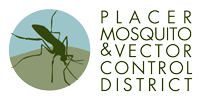In the past week, we’ve received a record number of public service requests about mosquito activity. We appreciate our residents reporting unusually high mosquito activity in the county through our website and by phone. Our administrative and field staff have been working hard to respond quickly to your reports by returning calls and emails and conducting property inspections. Anopheles freeborni, the rice field mosquitoes, have been extremely active this last week.
Two important notes:
1. Anopheles freeborni mosquitoes do not spread disease in our county.
2. Your best protection from mosquito bites is using repellent with ingredients like DEET, Picaridin or IR3535, close doors and windows or check screens to make sure they are in good condition to keep these mosquitoes from coming inside your home.
Placer County has over 30 species of mosquitoes. Every different species is active at different times of the year, has different behavior and different lifecycles.
Unlike the West Nile virus carrying mosquitoes (Culex spp.) or our invasive mosquitoes (Aedes aegypti), Anopheles mosquitoes typically use standing water in rural areas in the summer and fall to develop into adults, then the female adult mosquitoes overwinter in vegetation or around structures during the winter. A female Anopheles mosquito can travel many miles from where it develops to where it chooses to overwinter. When daytime temperatures get into the 60s, these mosquitoes awaken and look for a blood meal (i.e. bite you) to prepare to lay eggs later in the spring. They can be aggressive biters and try to get inside your home. When the weather is cold again, the Anopheles mosquitoes will become dormant again until the next time it is warm.
At Placer Mosquito, our biggest concern is keeping Placer County residents safe from vectors and vector-borne diseases. We also rely on assistance from the public in protecting themselves from these vectors like using repellent and dumping and draining standing water.
Mosquitoes have been active in Placer County for hundreds of years and there is no safe way to completely get rid of all mosquitoes in the county that’s safe for the environment, people, and other living organisms. Our focus in our mosquito response is to limit the potential of disease transmission risk to people by collecting mosquitoes, identifying the species, testing these mosquitoes for diseases, reporting this information to the public and making appropriate treatments as needed.
Because Anopheles mosquitoes become active suddenly and then return to a dormant state very quickly in the winter and early spring, mosquito control measures that are commonly used in the summer against other species of mosquitoes are not effective. The District is working to develop strategies to reduce Anopheles mosquito populations before they move into populated areas in the late summer and fall. We are also working closely to monitor any potential risk of disease transmission in the future due to Anopheles mosquitoes in our area. While some outbreaks of Anopheles can be surprising in mid-winter on nice days, cooler weather will put them back into an overwintering state very quickly. It’s more important to try to keep these mosquitoes outside of your home and use an EPA-registered repellent or wear long sleeves and pants when going outside.






